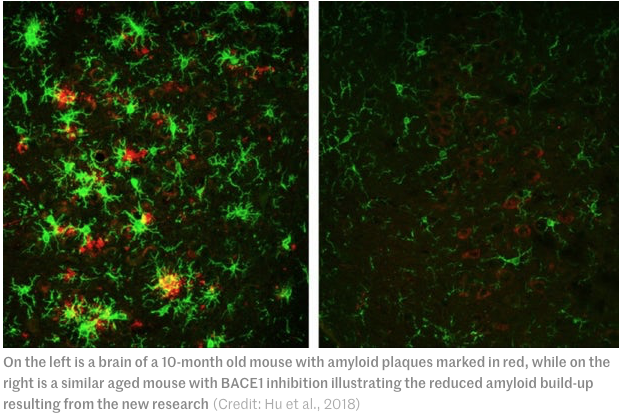 New study reverses Alzheimer's in mice, while similar big clinical trial fails
New study reverses Alzheimer's in mice, while similar big clinical trial fails
A new study has successfully reversed both the biological and behavioral hallmarks of Alzheimer's disease in mouse models. The research found that slowly depleting the presence of a certain enzyme can reverse the formation of amyloid plaques in the brain. Illustrating the tricky path current Alzheimer's research faces, the study was published literally hours after giant pharmaceutical company Merck announced the cancellation of a Phase 3 clinical trial surrounding a drug that targets the exact same enzyme.
The new study from a team at the Cleveland Clinic Lerner Research Institute focused on an enzyme called BACE1 (aka beta-secretase), which is known to contribute to the formation of the toxic amyloid proteins that congregate as plaques on the brain, and are hypothesized to be the source of most Alzheimer's symptoms.
Completely blocking BACE1 in previous mouse models has resulted in major brain defects, as the enzyme controls several fundamental developmental processes. So the team engineered a mouse model that gradually lost the enzyme as it grew older and then bred those mice with rodents that were engineered to develop amyloid plaques from an age of 75 days.
This allowed the researchers to simulate both the age-related progression of Alzheimer's disease, and an associated progressive reduction in BACE1 activity. The results were remarkably positive, with the reduction in BACE1 activity not only stalling the development of amyloid plaques in the mice, but actually removing the deposits that had already formed. At 10 months of age the mouse models were found have no amyloid plaque deposits at all.
Read more: http://bit.ly/2EuNVMw
The new study from a team at the Cleveland Clinic Lerner Research Institute focused on an enzyme called BACE1 (aka beta-secretase), which is known to contribute to the formation of the toxic amyloid proteins that congregate as plaques on the brain, and are hypothesized to be the source of most Alzheimer's symptoms.
Completely blocking BACE1 in previous mouse models has resulted in major brain defects, as the enzyme controls several fundamental developmental processes. So the team engineered a mouse model that gradually lost the enzyme as it grew older and then bred those mice with rodents that were engineered to develop amyloid plaques from an age of 75 days.
This allowed the researchers to simulate both the age-related progression of Alzheimer's disease, and an associated progressive reduction in BACE1 activity. The results were remarkably positive, with the reduction in BACE1 activity not only stalling the development of amyloid plaques in the mice, but actually removing the deposits that had already formed. At 10 months of age the mouse models were found have no amyloid plaque deposits at all.
Read more: http://bit.ly/2EuNVMw


